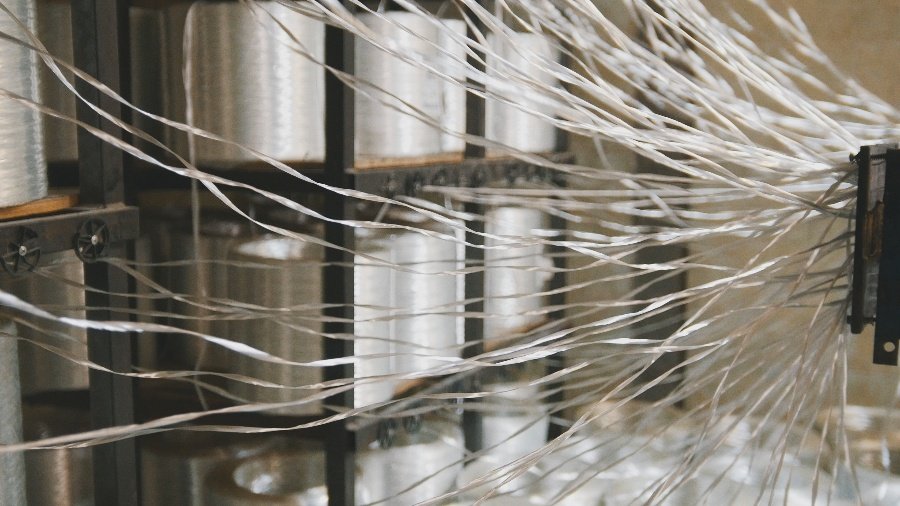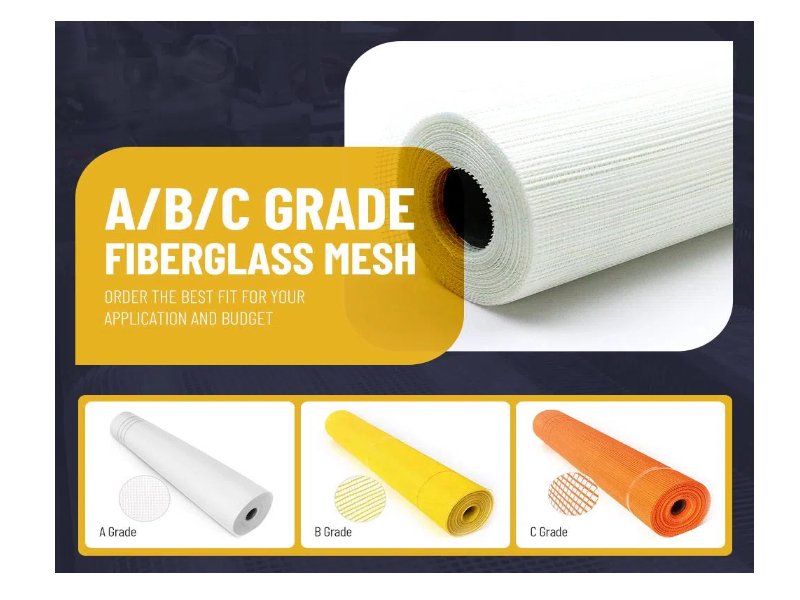
- fiberglassnicole@gmail.com
- +86-13933702587

Have you ever wondered about the intricacies of fiberglass mesh? As the leading fiberglass manufacturing company in China, specializing in high-quality fiberglass mesh, Niumaterial has been at the forefront of the textile industry for over two decades. In this comprehensive blog post, we delve into ten crucial questions about fiberglass mesh roll, shedding light on its composition, uses, strength, temperature rating, characteristics, types, and more. Let’s embark on a journey of understanding the nuances of this versatile material.
Fiberglass mesh is composed of thin, interwoven strands of glass fibers coated with a protective resin. These fibers are usually made from molten glass that is drawn into fine threads, creating a flexible and lightweight mesh structure. The mesh is then coated with a polymer resin to enhance durability and resistance to various environmental conditions. The combination of glass fibers and resin results in a strong, versatile material that has found numerous applications in construction and other industries.
Fiberglass mesh is often manufactured using a weaving process where the glass fibers are arranged in a crisscross pattern. This weaving technique contributes to the mesh’s flexibility and strength. The specific composition and manufacturing processes can vary, but the fundamental components are glass fibers and a resin coating.
Fiberglass mesh serves a wide range of purposes across various industries, with its primary application being in construction. One of the most common uses is reinforcing surfaces such as walls and ceilings during plastering or stucco applications. The mesh adds strength to the structure, preventing cracks and enhancing the overall integrity of the surface.
Additionally, fiberglass mesh repair is extensively used in the manufacturing of composite materials, reinforcing products like fiberglass panels and sheets. Its lightweight and durable nature make it an ideal choice for creating strong yet flexible structures.
In the realm of outdoor projects, fiberglass mesh is employed for reinforcing materials like asphalt and concrete, providing enhanced resistance to cracking and improving the longevity of driveways, sidewalks, and other paved surfaces.
Beyond construction, fiberglass mesh is utilized in various industrial applications, such as filtration systems and reinforcement in products like boats and automotive components. Its versatility, corrosion resistance, and durability make it a preferred material in many sectors.
The strength of fiberglass mesh is notable, and it is often measured in terms of tensile strength, which is the maximum stress a material can withstand while being stretched or pulled before necking, which is when it starts to significantly deform. fiberglass mesh fabric exhibits excellent tensile strength due to the inherent strength of glass fibers.
The strength of fiberglass mesh can vary depending on factors such as the thickness of the fibers, the weaving pattern, and the type of resin used for coating. Generally, fiberglass mesh is strong enough to provide effective reinforcement in construction applications, preventing cracks and enhancing the durability of surfaces.
In comparison to traditional mesh materials like steel, fiberglass mesh strength offers the advantage of being lightweight while maintaining impressive strength characteristics. This combination of strength and low weight makes fiberglass mesh a practical choice for various applications.
Fiberglass mesh is known for its thermal stability and can withstand a broad range of temperatures. The temperature rating of fiberglass mesh typically depends on the type of resin used in its manufacturing. In general, fiberglass mesh can handle temperatures ranging from -40°C to 110°C (-40°F to 230°F).
This temperature resistance makes fiberglass mesh suitable for use in both hot and cold climates, ensuring its effectiveness in diverse environmental conditions. It is crucial to consider the specific temperature requirements of a project and choose a fiberglass mesh material with a resin that aligns with those needs.
The inherent thermal stability of fiberglass mesh contributes to its durability, as it can withstand temperature fluctuations without compromising its structural integrity.
Fiberglass mesh possesses a set of characteristics that contribute to its widespread use in various applications:
Fiberglass mesh is known for its high tensile strength and durability, providing reliable reinforcement in construction projects.
The flexible nature of fiberglass mesh allows it to conform to different surfaces, making it suitable for irregular or contoured structures.
Unlike metal meshes, fiberglass mesh is corrosion-resistant, ensuring longevity and reliability in diverse environmental conditions.
Fiberglass mesh is resistant to many chemicals, making it suitable for applications where exposure to corrosive substances is a concern.
The lightweight nature of fiberglass grid mesh simplifies handling and installation, reducing the overall weight of structures without compromising strength.
Fiberglass mesh can withstand a broad range of temperatures, maintaining its structural integrity in hot and cold environments.
In some applications, particularly those involving coatings and finishes, fiberglass mesh’s transparency allows it to blend seamlessly without affecting the appearance of the final product.
Understanding these characteristics is crucial when selecting fiberglass mesh for a particular project, as they determine the mesh’s suitability for specific conditions and applications.
Several types of fiberglass mesh are available, each designed for specific applications and performance requirements. The main types include:
This type is commonly used in construction applications, especially for reinforcing cement-based materials. The alkali-resistant coating ensures compatibility with alkaline substances present in cement.
Featuring an adhesive backing, this type simplifies installation by allowing the mesh to stick directly to surfaces. It is often used in drywall applications and repairs.
Suitable for applications where high temperatures are a concern, this type of mesh can withstand elevated temperatures without compromising its structural integrity.
The coating on this type of mesh enhances its resistance to weathering, chemicals, and UV radiation, making it suitable for outdoor applications.
This type incorporates additional reinforcement in the form of fiberglass strands or other materials, providing enhanced strength for demanding applications.
Choosing the right type of fiberglass mesh depends on the specific requirements of the project, including the type of material being reinforced, environmental conditions, and the desired level of strength.
When it comes to waterproofing applications, alkali-resistant fiberglass mesh is often the preferred choice. This type of mesh is designed to resist the alkaline conditions present in cement-based materials, making it suitable for reinforcing surfaces that will be subjected to moisture and water exposure.
In waterproofing applications, alkali-resistant fiberglass mesh net is commonly used in conjunction with waterproofing membranes and coatings. The mesh adds structural support to the waterproofing system, preventing cracks and ensuring the longevity of the waterproofing solution.
The choice of mesh for waterproofing also depends on the specific requirements of the project, such as the type of substrate, environmental conditions, and the expected level of exposure to water. Proper installation techniques, including overlap and embedding in the waterproofing material, contribute to the effectiveness of the fiberglass mesh in waterproofing applications.
Fiberglass mesh, a type of concrete reinforcement made from synthetic fibers, including fiberglass, adds significant strength to concrete. The exact increase in strength depends on factors such as the type and dosage of fibers, the concrete mix design, and the specific application. Generally, fiberglass mesh is known to enhance concrete’s toughness, impact resistance, and durability.
In terms of specific numbers, the strength added by fiberglass mesh can vary. However, it is common for concrete with fiberglass mesh fabric to exhibit improvements in flexural strength,compressive strength, and impact resistance. The fibers in fiberglass mesh act as micro-reinforcement, providing support in preventing crack propagation and distributing loads more effectively within the concrete matrix.
The dosage of fiberglass mesh added to concrete mixtures varies depending on the desired level of reinforcement. Common dosages range from 0.5 to 2.5 pounds of fibers per cubic yard of concrete. It is crucial to follow the manufacturer’s recommendations and guidelines for proper incorporation and distribution of fiberglass mesh within the concrete mix.
Choosing the right fiberglass mesh involves considering various factors to ensure that the selected mesh meets the specific requirements of the project. Here are key considerations when making this decision:
Identify the primary application of the mesh. Different types of fiberglass mesh are designed for specific purposes, such as plastering, stucco, concrete reinforcement, or drywall applications. Choose a mesh that aligns with the intended use.
Assess the strength requirements of the project. Consider the tensile strength and load-bearing capacity needed for the application. For heavy-duty applications, such as concrete reinforcement in driveways, a stronger mesh with higher tensile strength may be required.
Consider the environmental conditions the mesh will be exposed to, including temperature fluctuations, moisture, and chemical exposure. Choose a mesh with suitable characteristics, such as temperature resistance and chemical resistance, to ensure long-term performance.
Select the appropriate type of fiberglass mesh based on the project requirements. For example, alkali-resistant mesh is suitable for applications involving cement-based materials, while self-adhesive mesh simplifies installation in drywall and repair projects.
Consider the scale of the project and budget constraints. Some projects may benefit from specialized or high-performance meshes, while others may require a more cost-effective solution. Balance performance requirements with budget considerations.
By carefully considering these factors, project managers, contractors, and homeowners can make informed decisions when selecting fiberglass mesh, ensuring optimal performance and longevity in various applications. Proper installation and adherence to guidelines further contribute to the effectiveness of fiberglass mesh in enhancing the strength and durability of structures.
Fiberglass mesh is more than just a material, it’s the key to your project’s success. As a Niumaterial company, we will continue to be committed to providing excellent products and services that meet our customers’ high requirements for quality and reliability. If you have any further questions or needs, please feel free to contact us.

If you have any questions
Please contact us for free consultation and product quotation

You can leave the specifications and contact information you need~ Our technicians will immediately organize the exclusive information for you and send it to your email!
You can leave your contact information here, and we will send you detailed specifications and application cases to make your purchase clearer~